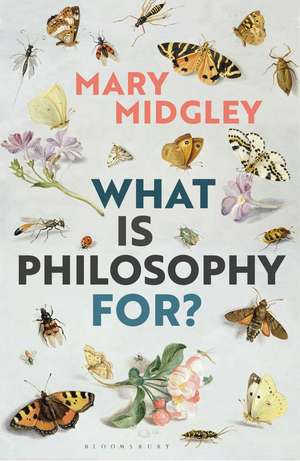What Is Philosophy for?
Autor Mary Midgleyen Limba Engleză Paperback – 19 sep 2018
| Toate formatele și edițiile | Preț | Express |
|---|---|---|
| Paperback (1) | 146.36 lei 3-5 săpt. | +25.71 lei 4-10 zile |
| Bloomsbury Publishing – 19 sep 2018 | 146.36 lei 3-5 săpt. | +25.71 lei 4-10 zile |
| Hardback (1) | 434.71 lei 6-8 săpt. | |
| Bloomsbury Publishing – 19 sep 2018 | 434.71 lei 6-8 săpt. |
Preț: 146.36 lei
Preț vechi: 158.97 lei
-8% Nou
Puncte Express: 220
Preț estimativ în valută:
28.00€ • 29.24$ • 23.13£
28.00€ • 29.24$ • 23.13£
Carte disponibilă
Livrare economică 25 martie-08 aprilie
Livrare express 08-14 martie pentru 35.70 lei
Preluare comenzi: 021 569.72.76
Specificații
ISBN-13: 9781350051072
ISBN-10: 1350051071
Pagini: 232
Dimensiuni: 129 x 198 x 15 mm
Greutate: 0.32 kg
Editura: Bloomsbury Publishing
Colecția Bloomsbury Academic
Locul publicării:London, United Kingdom
ISBN-10: 1350051071
Pagini: 232
Dimensiuni: 129 x 198 x 15 mm
Greutate: 0.32 kg
Editura: Bloomsbury Publishing
Colecția Bloomsbury Academic
Locul publicării:London, United Kingdom
Caracteristici
Mary Midgley's work is undergoing a renaissance and there is renewed interest in the 'golden age' of women in philosophy - the post-ward years in Oxford - of which Midgley was a key figure
Notă biografică
Mary Midgley is Senior Lecturer Emeritus in Philosophy, Newcastle University, UK. One of the leading moral philosophers of the 20th century, Midgley has written extensively on human nature, science, ethics, animals, and the environment. Her books include Beast and Man, Heart and Mind, Animals and Why They Matter, Are You an Illusion? and Wickedness.
Cuprins
Part 1. The Search for SignpostsChapter 1. DirectionsChapter 2. Do Ideas Get Out Of Date?Chapter 3. What is Research? Chapter 4. Clashes of MethodChapter 5. What is Matter?Chapter 6. Quantum QueriesChapter 7. What is Progress?Chapter 8. Perspectives and Paradoxes: Rousseau And His Intellectual ExplosivesChapter 9. Mill And The Different Kinds Of FreedomChapter 10. Making Sense Of TolerationPART 2. Tempting Visions of Science Chapter 11. The Force of World-PicturesChapter 12. The Past Does Not DieChapter 13. Scientism; The New SedativePART 3. Mindlessness and Machine WorshipChapter 14. The Power-StruggleChapter 15. Missing PersonsChapter 16. Oracles PART 4. Singularities and the CosmosChapter 17. What Kind of Singularity?Chapter 18. Can Intelligence be Measured? Chapter 19. What is Materialism? Chapter 20. The Cult of ImpersonalityChapter 21. Matter and RealityChapter 22. The Mystique of ScientismChapter 23. The Strange World-Picture Conclusion: One World but Many Window
Recenzii
Engaging and accessible, this vigorous swansong exemplifies many of Midgley's virtues, and revisits many of her favourite themes ... [it helps] us to see that many of our problems arise from trying to fit everything into a single explanatory template, rather than realising that one and the same reality can be understood from irreducibly different points of view.
Her final answer to the question "What is philosophy for?" is that its aim is not at all like that of the sciences. Scientists are specialists who study parts of the world, but philosophy concerns everybody. It tries to bring together aspects of life that have previously been unconnected in order to make a more coherent world-picture, which is not a private luxury but something essential for human life.
[This] is a book that not only illuminates the dangers and shortfalls of contemporary unrestrained faith in scientific and technological supremacy, it also accentuates the integrating qualities of philosophy which are necessary to achieve a more exhaustive view of the world and its complexities.
Her final answer to the question "What is philosophy for?" is that its aim is not at all like that of the sciences. Scientists are specialists who study parts of the world, but philosophy concerns everybody. It tries to bring together aspects of life that have previously been unconnected in order to make a more coherent world-picture, which is not a private luxury but something essential for human life.
[This] is a book that not only illuminates the dangers and shortfalls of contemporary unrestrained faith in scientific and technological supremacy, it also accentuates the integrating qualities of philosophy which are necessary to achieve a more exhaustive view of the world and its complexities.
